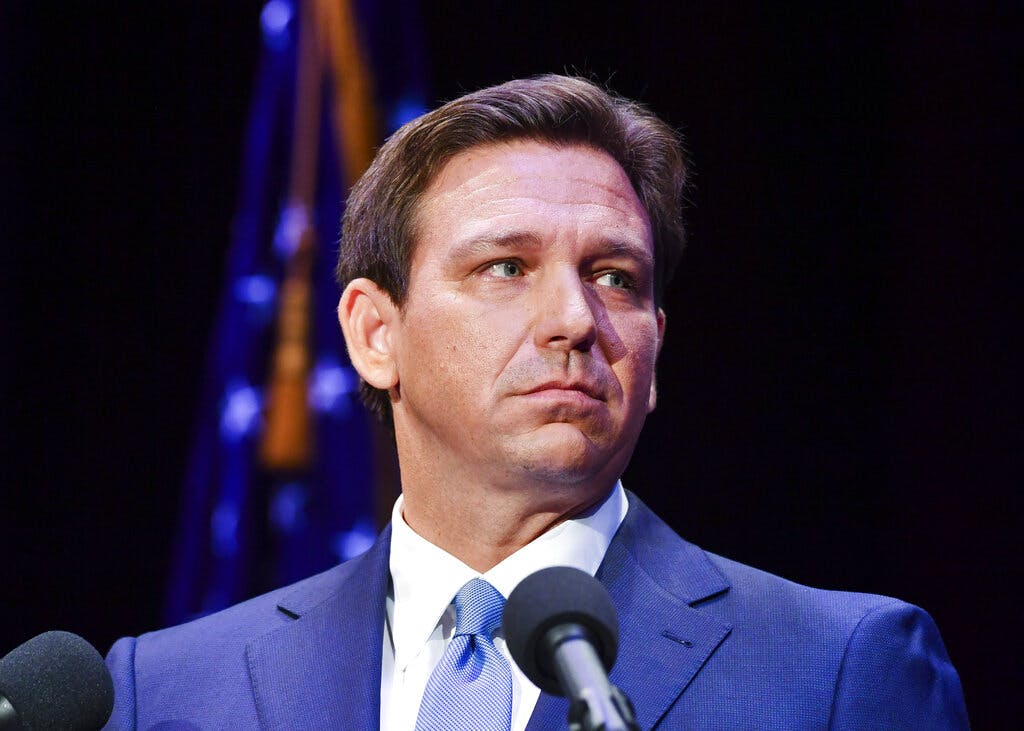DeSantis, in New Book, Calls for Making America Like Florida
The governor makes the case for a Hamiltonian executive rather than limited government.

‘The Courage to Be Free. Florida’s Blueprint for America’s Revival’
By Ron DeSantis
HarperCollins, 288 pages
“Florida was a refuge of sanity when the world went mad,” Ron DeSantis declared in his victory speech after he was re-elected in 2022 as governor of the Sunshine State. “We faced attacks. We took the hits. We weathered the storms. But we stood our ground.”
Mr. DeSantis had just won by a nearly 20-point margin in what was considered a swing state. “Two more years,” the crowd shouted — prodding him to run for president in 2024 instead of completing his four-year term.
Mr. DeSantis has yet to officially declare his candidacy for the Republican nomination for president, but it is widely expected that he will run. His new book, “The Courage to Be Free: Florida’s Blueprint for America’s Revival,” is a model of what a DeSantis presidential campaign might look like.
In “The Courage to Be Free,” Mr. DeSantis repeats the themes of his victory speech and introduces himself — his upbringing, education, and military service — to readers and, potentially, voters.
The governor also details his successes in governing Florida and battling what he calls the “biomedical security state,” legacy media, “woke corporations,” and “indoctrination in schools.”
“Florida has shown that we have the capacity to win against these elites,” Mr. DeSantis writes. “It requires strategic judgment. It calls for strength in the face of attacks. Most of all it requires courage.”
To hammer home the point, the first chapter is called “The Florida Blueprint,” and the final chapter is titled “Make America Florida.” His homage to Mr. Trump’s “Make America Great Again” slogan encapsulates the message of the tome: Mr. DeSantis is framing himself as a more effective, younger, more electable version of Donald Trump.
The book is already the no. 1 best seller on Amazon, and Mr. DeSantis’s electoral prospects look similarly robust. Early polls show him either beating or coming in second to Mr. Trump in a hypothetical 2024 Republican primary.
Mr. DeSantis is following an established tradition of publishing a book before a presidential bid. The book tour will allow him to introduce himself to a national audience without the scrutiny or campaign finance regulations that accompany a presidential campaign.
Other potential 2024 candidates who have recently published books include Secretary Pompeo, Senator Scott of South Carolina, and Vice President Pence.
The governor, in his book, describes his “blue collar” upbringing in Florida but also makes sure to mention that his parents are from Pennsylvania and Ohio and that he grew up with Rust Belt values.
This is significant in that the crumbling of the so-called blue wall was essential to Mr. Trump’s victory in 2016, and Mr. DeSantis is establishing himself as a man of this same working-class base.
Mr. DeSantis also dedicates a chapter to his Yale and Harvard education, signaling that he’s smart but also distancing himself from “the elite” and the liberal institutional capture he rails against. Mr. DeSantis largely refrains from criticizing Mr. Trump in the book, though he inserts slight digs along the way.
Although framed as a retelling of establishment GOP criticisms of Mr. Trump during the 2016 cycle, Mr. DeSantis’s story reminds readers of Mr. Trump’s “liberal past, including his big donations to liberal candidates like Hillary Clinton, Chuck Schumer, and Harry Reid; and his support for liberal abortion laws and restrictions on gun rights.”
Mr. DeSantis also mentions Mr. Trump’s avoidance of the draft — a contrast to the governor’s own military service, which he spends a chapter detailing. Mr. DeSantis needs Mr. Trump’s base, though, to win the primary and the general election, and to that end the Florida governor is careful to praise Mr. Trump for eschewing establishment Republican concerns in favor of those of the party’s previously neglected base.
Mr. DeSantis calls himself “one of the earliest opponents in Congress of the Russia collusion investigation,” and retells the decision to move the American embassy in Israel to Jerusalem from Tel Aviv with himself in a starring role. He also expresses disappointment that more wasn’t achieved in the first two years of the Trump presidency, when Republicans controlled both houses, particularly in terms of building the wall.
Mr. DeSantis calls Florida the “Free State” and extolls the large migration of Americans there since the start of the pandemic. He highlights his pushback against Covid policy orthodoxy, from opposing vaccine mandates to opening businesses and schools early. He has largely been vindicated on his Covid policies, though he took major heat at the time.
Mr. DeSantis tries to frame his battle against critical race theory, gender ideology, and Disney in this same vein. This is not a book for the left — the New York Times promptly panned it — and Mr. DeSantis throws plenty of red meat to the base, particularly on these issues.
There are two lists in his book: One is his promises for his first term as governor, which, unsurprisingly, he counts as fulfilled. The longer list tallies examples of critical race theory and “woke indoctrination” that he says he pulled from the work of a Manhattan Institute scholar, Christopher Ruffo. Those who don’t already agree with Mr. DeSantis on these issues are unlikely to be persuaded.
Democrats and some Republicans have criticized Mr. DeSantis for using governmental power to go after private businesses like Disney. Mr. DeSantis defends his wielding of what he calls a strong Hamiltonian executive to push back against liberal ideology. He says that when he first entered office he asked staff to “amass an exhaustive list of all the constitutional, statutory, and customary powers of the governor.” He is critical of traditional limited-government conservatives.
“For years, the default conservative posture has been to limit government and then get out of the way,” Mr. DeSantis writes. “Elected officials who do nothing more than get out of the way are essentially green-lighting these institutions to continue their unimpeded march through society.”
On an ironic note considering his battle with the company, Mr. DeSantis discloses that he got married at Disney World. He also describes his wife’s battle with breast cancer, and the details of his marriage and family relationship add a humanizing touch.
Mr. DeSantis attempts to portray himself as a capable and effective governor, and to show how his model for Florida can be adopted for America. The theme that he bucks public opinion polls and forges his way with “courage” gets repetitive halfway through the book, as all stump speeches do.
Mr. DeSantis is writing for the GOP primary voter rather than trying to win over disaffected liberals or moderates. He is positioning himself as the most capable defender of “common sense” Americans.
For those who want to “Make America Florida,” Mr. DeSantis makes a compelling case for his candidacy. For those who think Mr. DeSantis has gone too far in using his executive power to limit dissenting views from his own, his prose is unlikely to change their vote.

